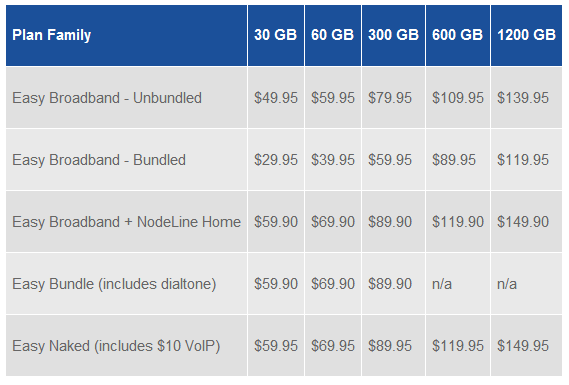news National broadband provider and iiNet subsidiary Internode has announced revised broadband plans, with reduced prices and data quotas aligned to its popular NBN plans. And parent iiNet has introduced Internode’s data blocks feature to its own plan structure.
Responding to customer demands, Internode has introduced a new intermediate level plan, with a 60 GB data quota for $10 a month more than its entry-level 30 GB plan. It has also reduced the cost of its 300GB data quota plan by $10 a month, and reintroduced a 600GB data quota plan. A 200GB plan that was available earlier is no longer offered, widening the gap between the 60GB quota plan and the 300GB quota plan. It has also raised its largest data quota plan from 1 terabyte or 1024 GB to 1200 GB without any increase in price. Revised plans show that the rates are competitive and offer a wider spread to meet the needs of customers.
Internode product manager Jim Kellett said the changes in the revised plan table provided better value for money to Internode’s customers. “Only customers on our existing 300GB plans will automatically migrate to the new plans,” he said, “thereby saving them $10 per month for the same data quota. Other customers can choose to move to a new plan if they want or stay on the current plan if they prefer.” The Internode website provides details of the revised plans.
In a related development, iiNet introduced a Data Packs program, which is aimed at those who want to add extra quota to their monthly total on an an ad-hoc basis. Data Packs are blocks of quota available for purchase for customers who may have hit their usage limit. By purchasing a Data Pack, the current usage so far for that billing period will be reduced by a set amount.
Data Packs come in a range between 5GB ($10) and 100GB ($80). Each Data Pack can be applied to either peak or off-peak periods and you can select which one you want when purchasing the data pack. They can be purchased and monitored in iiNet’s Toolbox customer option page, where customers can also view past Data Pack purchases. The Data Pack will not roll into the next billing period if not fully used. Customers using business and residential plans of iiNet, Westnet and Netspace services are eligible for Data Packs.
opinion/analysis
I like Internode’s plan changes. The company’s quota tiers make a lot of sense, and they’re fairly competitively priced in Australia’s broadband market (although obviously not to the same level that plans from cut-rate providers like TPG, Dodo and Exetel are). Furthermore, the quota tiers offer all levels of customers decent options, and the ‘Node has even given the most demanding customers 200GB of extra quota for free. You can’t complain about that.
It’s also interesting to see some Internode features already cross-pollinating into the iiNet world, just months after the acquisition took place. Data packs have been a feature that many customers have liked for a long time — they have allowed customers the flexibility to have a ‘big month’ in terms of downloads, without automatically having to migrate to a higher value plan, which may come with monthly quota they don’t need on a regular basis.
The fact that this Internode feature has come across so quickly to iiNet speaks volumes about the technical capability and speed of the two companies. I can’t imagine similar feature cross-pollination occurring so quickly in a company like Telstra, Optus or even Vodafone. Kudos to iiNode.
Internode’s new plans:
Opinion/analysis by Renai LeMay



lol I moved house on the weekend and moved my account across to the new house, they’ve put me on the 200Gb plan which isn’t to connect yet. *goes off to check how much I’m paying for that*
Yeah I’m paying $89.95 for 200Gb including the $10 power pack. lol I’m on a ‘retired’ plan again >_<
Hmmm… I’m paying Internode $60 per month for 150Gig on their Easy-Broadband-S package. I guess that one’s been retired.
The nearest new equivalent plan will more than halve my quota for the same monthly cost! Or for $10 a month less, I can have one fifth of my current quota.
Pardon me if I stay with what I’ve got.
It was retired the last time they changed their plans. I’m on it too – I think there must’ve been too many people that could count, so they got rid of it.
Yeah I was on this at the old house. Called them up to see if I could stay on it at the new house and they told me no :(
Good to know… the gf wants to move so she can have a balcony for plants… wonder if she’ll pay the difference in Internet costs.
I’ll also add I wasn’t in contract. If I was in contract I could of kept the plan I was on as they’d move the contract to the new house.
Certain shadow ministers can stuff this in their pipe and smoke it.
So which one is Internode and which is iiNet, the red boy or the blue boy?
Sorry Renai, But all they’ve done is drop there pricing on their own dslam stuff, telstra dslam pricing still sucks bigtime. They can blame telstra wholesale all they like, but ultimately the buck stops with them.
These Data Packs are probably the way of the future. As internet becomes less of a luxury item and more of a basic utility, I can see plans transitioning to a more “pay as you go” system – it’s easier to understand, gives the providers a much more straightforward ROI, and much like electricity will not stop people from using it as they see fit.
They might exist side by side with true unlimited plans at different speeds; if the rates are reasonable, those two options cover pretty much everyone’s needs.
Various ISPs have tried to shift to pay as you go, the most recent being Exetel, but it’s always been my impression it never quite works for them, as it doesn’t offer the artificially high profit margins ISPs can get for charging for quota which most ppl never use ;)
Hey Brad Cann,
Actually, the buck stops with you – if you dont like it, change provider.
If Telstra are giving uncompetitive pricing to ‘node for Telstra wholesale, they’ve got two choices – provide coverage under Telstra Wholesale (and charge you the higher rate) or pull their connectivity via TW and leave you with… gee, Telstra direct…
Personally, I’d pay the difference rather than go to Telstra direct (where you’ll be charged both directions, crap support and all the other fun stuff that being a Telstra customer involves)
-JayTee
I am not with node nor telstra direct, nor will i ever likely be. Node uses TW customers to subsidise their own dslam users. if node were serious about price dropping (and a lot of other ISP’s can afford much cheaper pricing) then they would drop pricing on the TW dslam pricing. instead its just yet another round of price drops for the haves at the cost of the have nots (no competition due to no dslams). I am not asking Node to become a TPG style provider, but the wholesale dslam costs are not what node make it out to be to justify the big price difference.
>>Node uses TW customers to subsidise their own dslam users.
Sorry – you have that comment completely back-to-front.
The margins on TW ports are pretty slim. The whole point of building DSLAMs is to reduce costs. Sure, it gives control over the product definition, but the business case is what drives the investment.
Internode is not a charity, they need to make some money to keep the investors happy. They might not be the cheapest, but I can’t think of any others who provide a call back service for technical calls. And the best think about Internode, they are not Telstra or Optus.
Netspace had callback, iiNet had callback. I don’t know about others as I haven’t been with them recently but it’s common.
Comments are closed.